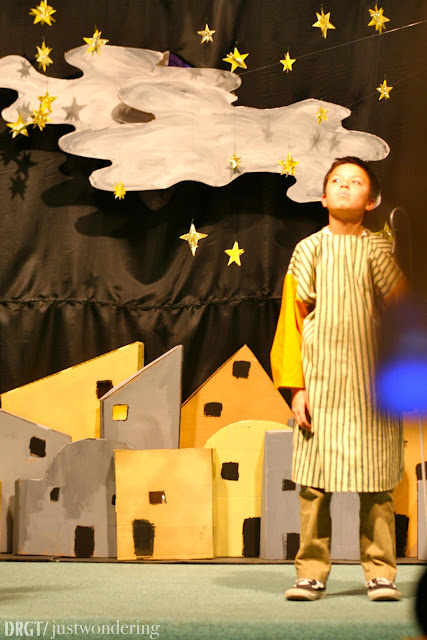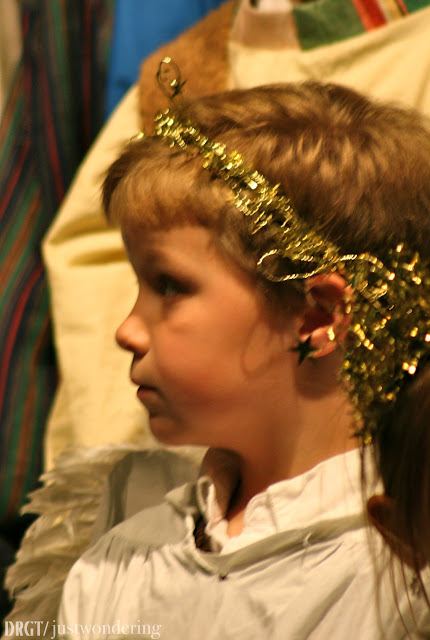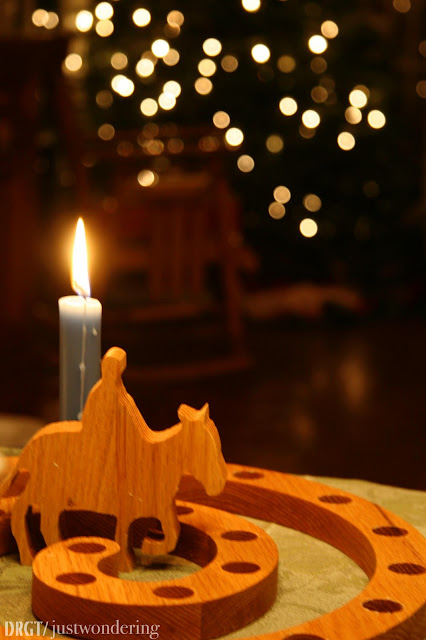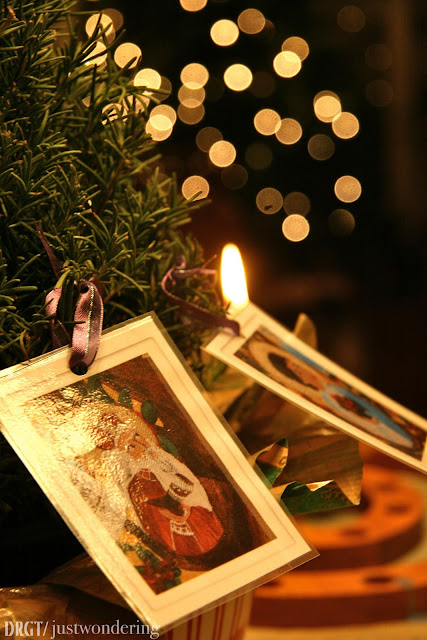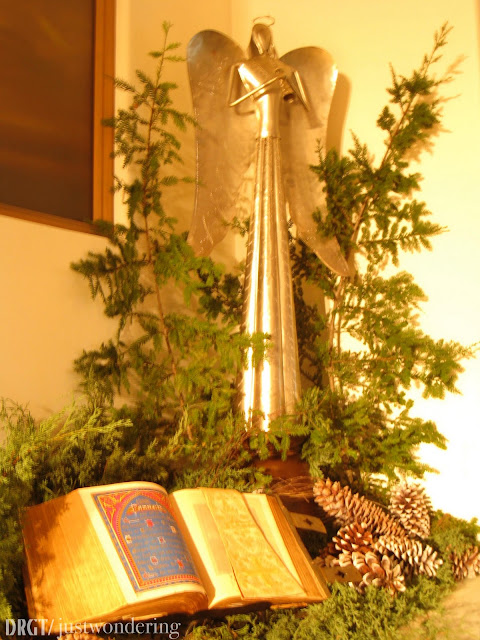An Advent Journey: Stop, Look, Listen – Day 3
An Advent Journal: Stop, Look, Listen – Day 2
“I, Paul, together here with Silas and Timothy, send greetings to the church at Thessalonica, Christians assembled by God the Father and by the Master, Jesus Christ. God’s amazing grace be with you! God’s robust peace!
It’s not that the puddles disappear or that the brown leaves are suddenly green again. No. The ugliness remains. But somehow, all that is dead and dying is more bearable, a kind of balance has been struck. I cannot explain it, I only know it when it happens. “Taking the trouble with the joy, the joy with the trouble.”
And into the middle of gray days and bone-chilling winds and too-early darkness comes. . . Advent. A small candle flickering against the gloom, a beacon of hope and promise. A time to wait, yes. But a time to wait with hope.
Where is your red leaf today? Where do you find hope?
Adjust our vision, Lord. Help us to see the trembling flame, the single shining beacon that will lead us to the center of the fulcrum. Help us to find that balance between trouble and joy. And then embolden us to help others find it, too. It doesn’t take much, does it? Just something the size of a red leaf.
An Advent Journey: Stop, Look, Listen – Day One, First Sunday
“Frank Tracy Griswold, presiding bishop of the Episcopal Church, is smiling benignly in his dog collar and steel-rimmed glasses, that strikingly intelligent, articulate, sweet-tempered man. He told me that once when he was taking a shower, he distinctly heard a voice from somewhere saying, ‘Why do you take your sins so much more seriously than I do?’ His first reaction was to burst into laughter. His second was to burst into tears.”
Something Sweet for December…
It’s that time of the month again – and I’m not talking hormones. It’s time to send sweet greetings to friends and family courtesy of TSP’s very fun adventure called, “Word Candy.” Chose a quote from a long list of categories, match it with a wonderful array of photos and post it on your blog, send it by email, tweet it or put it on your Facebook wall. Find your own fun by clicking on this line right here.
Tomorrow is the first official day of Advent and I’ll begin a series of daily devotionals in this space – much like I did during Lent earlier this year. A photo or two, a scripture passage for the day, a few reflections or a favorite quotation, and a short prayer. Gifts for the season, for you. And for me, too. May your waiting be rich and good this year.
This will serve as my Quiet for the Weekend post this week – joining with Sandy and with Deidra in being quiet and reflective today.
Still Center
and in from out,
and here from there.
A long leap,
an incandescent fall
from magnificent
to naked, frail, small,
through space,
between stars,
into our chill night air,
shrunk, in infant grace,
to our damp, cramped
earthy place
among all
the shivering sheep.
there he lies,
fast asleep.
the worst our kind can do, and shudder to know
the taint in our own selves, that awe
cracks the mind’s shell and enters the heart:
not to a flower, not to a dolphin,
to no innocent form
but to this creature vainly sure
it and no other is god-like, God
(out of compassion for our ugly
failure to evolve) entrusts,
as guest, as brother,
the Word.
And on a lighter note…Advent Four: Christmas Pageant!
As we filed out of the sanctuary, filled with the sweetness of the story and the wonder of it all, we noticed the doors at the end of the center aisle. We’ve visited this church a half dozen times and never seen these beautiful wood carvings. The one pictured above is perfect for this particular Sunday in the church year and the other one is of the Good Shepherd with his sheep. Somehow, it felt right to see this picture of the grown-up Babe of Bethlehem, welcoming the children.
For aren’t we all children, even those of us grown old and weary? In fact, if we can stay in touch with that child within, we’re far more likely to experience the power of the story.
If we can see ourselves there, standing with the shepherds, singing with the angels, traveling with the magi – then the story can become part of us.
For it’s this story that tells us, isn’t it?
Oh, that we might all have the eyes of children,
to truly see the wonder that is Christmas,
the glory that is encased in the flesh of that small babe,
the one who grew to welcome children
and to encourage us to be like them.
Merry Christmas, one and all!
This one goes over to L.L’s place and Laura Boggess’s Playdates with God – because really, that’s what it’s about: 

A Strange Advent
Life feels so strange just now:
delicate and ponderous,
uncertain and pre-determined,
incomplete, uncomfortable, gaping open,
like a sweater that no longer fits.
She asks the same questions,
over and over and over again.
She worries over the cost,
she wonders what will become of her,
she sobs at her helplessness.
Everything is shifting,
the child becomes the parent,
the parent, a child.
Groping in the dark, she becomes
the fulfillment of the Carpenter’s
long-ago warning:
“…when you were younger
you dressed yourself
and went where you wanted,
but when you are old
you will stretch out your hands
and someone else will dress you
and lead you where
you do not want to go.”
And I am the one in the lead.
I do not like it very much.
No, I do not like it at all.
Kyrie eleison.
Christe eleison.
Kyrie eleison.
The heavily pregnant Mary has been wandering the curving road to the House of Bread, Bethlehem. And she is almost there. We have been moving the candle each night that we’ve been home, moving it along the wooden spiral created by Caleb Voskamp at the tender age of 15. And we have been reading from Katharine Johnson’s lovely Jesse tree devotional, using icons her 14-year-old daughter painted. And weaving in and around these lovely pieces of young art has been the sad story of my aged mother’s move to assisted living, a move made necessary by blindness and memory loss.
And this is the cycle of life, isn’t it? We all grow old, all of us who were once young. We grow old. And we die. Some of us die relatively quickly; some of us take a long time. But each journey is fraught with uncertainty, with fear, with loss and with difficult decisions.
I think maybe the story we tell during each Advent season can bless us on this journey of aging. If we let it. The mother of Jesus was young, very young. And her world was turned upside down by events she neither planned nor expected. Scripture tells us that she said ‘yes’ to the unexpectedness of it all, that she said, “Let it be.” “Let it be to me according to your word.”
And Joseph did the same. He folded Mary in on the strength of a dream, he took on her shame, he took on her boy. He, too, said, “Let it be.”
And the two of them together, they took that curving road to the House of Bread. They found their way to an inhospitable and unwanted ‘home’ for the night. They spilled their tears and their blood on the ground of that dark cave so that Jesus, Emmanuel, might be birthed into our world. Together, they said, “Let it be.”
And they did it without knowing what they were doing, as all of us who take on the task of parenting do. We do not see into the future, we cannot know the pain, or the joy, that will come with the years.
But we can say, and we can live, this truth: “Let it be.”
We can take it all, the love and the laughter, the anger and the tears; the hopes and dreams and the harsh realities and stern wake-up calls; the energy of youth and the exhaustion of old age; the promise of life and the sober questions about death – we can take it all firmly in hand, receiving each piece as gift, and we can say: “LET IT BE.”
According to your word. According to your word.
I write tonight with a mixture of both sadness and of gratitude. I am grateful for the family I was born into, for my father’s passion for music and learning and family; for my mother’s graciousness, hospitality, great good humor and sharp mind; for my brother Tom’s keen wit, kindness, loyalty and tenderness; for my brother Ken’s sweetness despite a lifetime of heartache. My father has been gone for almost seven years now; my brother Ken for two. My mom is moving closer to the end of life (aren’t we all?) and Tom and I are each dealing with a plateful of challenges. As we left the mortuary after saying good-bye to Ken, Tom put his arm around my mother and me and said, “We’re down to just three now, aren’t we?” Yes, we are. And who knows when we will be just two. I pray daily for the grace to stand with Mary and Joseph, for the strength to remain steadfastly hopeful and thankful, even in the midst of loss and sorrow. Some days it’s a struggle. Some days it’s as easy as breathing. All days, I am grateful to God for each breath I am granted. And this day, I wish you all a very Merry Christmas and a blessed New Year.
Adding this to the list at several places this week. Please check them all out and read a few here and there. Always richness to be found in these places:
Advent 3: Good News!
the willingness to say,
but he was broken, even as we are broken.
that the Christmas tree becomes the cross,











